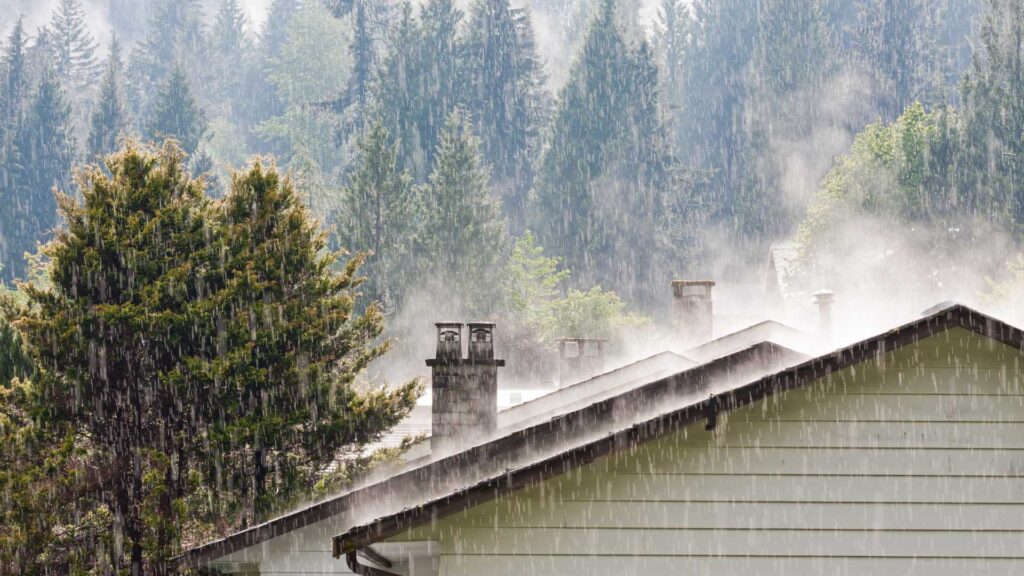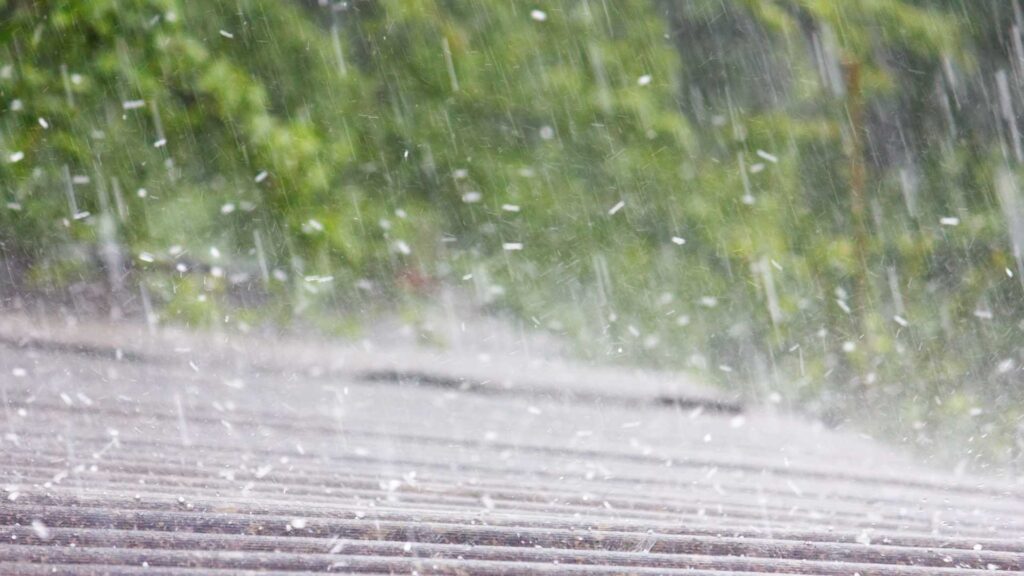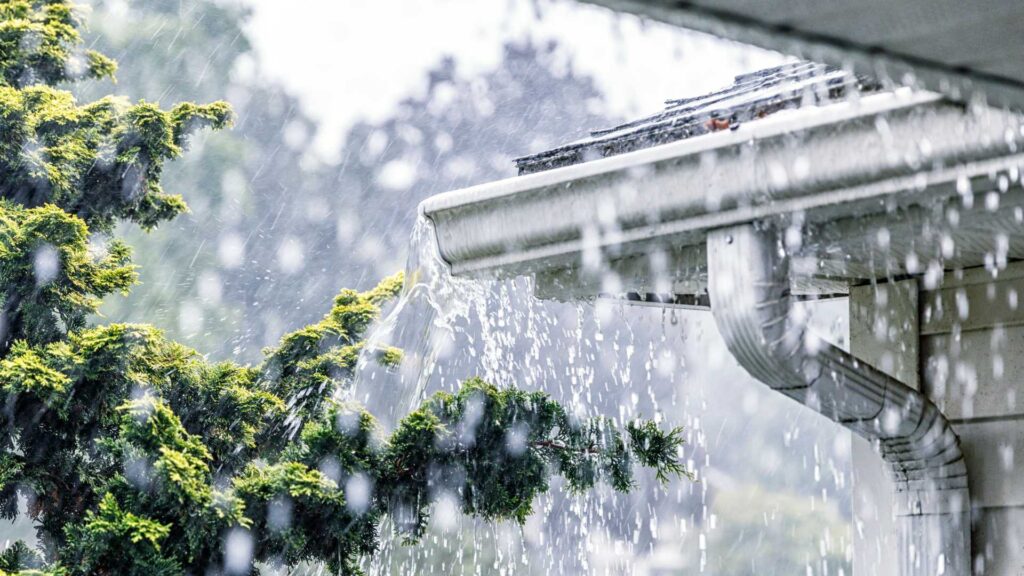Key Highlights
- A common misconception is that metal roofs are noisy during rain, but modern construction techniques significantly minimize this.
- The myth stems from older, less-insulated metal roofs commonly found on barns, creating a perception that all metal roofs are loud.
- Modern metal roofs, with proper insulation and underlayment, offer comparable noise levels to asphalt shingle roofs.
- Standing seam metal roofs, in particular, excel in noise reduction due to their concealed fastener systems and use of high-quality materials.
- Homeowner testimonials and expert opinions consistently confirm that well-installed metal roofs are surprisingly quiet, even in heavy rain.
Introduction
The sound of rain can feel very calm. It can make your home feel cozy. But, some homeowners worry about how loud it will be with a metal roof during rain. This worry is real. Metal roofing lasts a long time, so it makes sense to think about noise. This article will talk about noise related to metal roofing. It will clear up some myths and show that a good metal roof might be quieter than you expect.

Debunking Myths: The Noise Factor of Metal Roofs
The belief that metal roofing always makes a lot of noise in the rain is mostly wrong. While a plain sheet of metal can make rain sounds louder, modern metal roofing systems are made differently. They use different materials and designs that reduce rain noise and create a calm space inside the home.
Today’s metal roofs are not like the simple metal roofs from the past. New methods and materials have led to metal roofing systems that lower noise transfer effectively.
Where Does the Myth of Noisy Metal Roofs Originate?
The idea that metal roofs are noisy comes from older styles that are not insulated. These roofs are often seen on barns and sheds. They usually do not have a good roof deck or insulation, which makes sounds from rain and hail louder. Over time, this made people think all metal roofs are noisy.
However, a study by the Acoustic Group at the University of Lulea in Sweden showed that there is not a big noise difference. They found that rain hitting an asphalt shingle roof was measured at 46 decibels (dBA), while the noise from a metal roof was 52 dBA.
Since most people cannot notice a difference in sound that is less than 8 dBA, the noise level between these two roofing types is almost the same. This research shows that the belief that metal roofs are always noisy is often based on old ideas and information.

Comparing Noise Levels: Metal vs. Traditional Roofing Materials
When comparing noise levels between metal and asphalt shingles, it’s important to consider the construction of the roof. A properly installed metal roof with adequate insulation can be as quiet, if not quieter, than a traditional asphalt shingle roof. The table below provides a general comparison of noise levels:
| Roofing Material | Noise Level (dBA) | Description |
| Asphalt Shingles | 46 | Moderate rain noise, can vary with shingle quality |
| Metal Roof (Basic) | 52 | Slightly louder than shingles, more noticeable in heavy rain |
| Metal Roof (Insulated) | 40-45 | Comparable to or quieter than shingles, especially with added insulation |
This data illustrates that the type of metal roofing, installation techniques, and the amount of insulation used significantly impact noise levels. With advancements in metal roofing technology, noise concerns are minimized, ensuring a peaceful living environment.
The Construction Behind Quiet Metal Roofs
The secret to a quiet metal roof is how it is built. Today’s metal roofs are not just put straight on the rafters. They are part of a layered system. This system helps to keep outside noise from coming in.
Using good materials and careful installation is very important. These factors help to lower noise levels and make the inside of your home calm. This can be especially nice during heavy rainfall.
Materials and Techniques Reducing Rain Noise
Many important factors help reduce noise in modern metal roofing systems. One important factor is using solid decking. In the past, metal panels were often fixed directly to rafters. Now, modern systems use strong sheathing materials like plywood or oriented strand board (OSB).
This solid decking creates a strong base for attaching the metal panels. It acts as a sound barrier, soaking up and softening the noise of raindrops. This helps stop sound waves from easily moving into the home.
Additionally, how metal roofing is installed is key for cutting down noise. This is especially true for standing seam metal roofs. In these roofs, the fasteners are hidden under the metal panels. This design choice not only looks good but also reduces noise from exposed fasteners.
The Role of Insulation in Sound Dampening
Insulation plays an important role in how well a metal roof works. It helps save energy and keeps out noise. When insulation is added to the attic beneath the metal roof, it helps absorb sound.
This layer of insulation lessens the noise from rainfall hitting the metal panels. It stops the sound from moving through the roof deck and into the rooms below. The thicker the insulation is, the better it is at reducing noise.
Adding more insulation in the attic not only helps with sound but also saves energy by improving how the roof keeps heat in or out.

Real Homeowner Experiences with Metal Roofs During Rain
Many homeowners find that metal roofing helps keep their homes quiet during rainstorms. They often share how much less noise they hear compared to their old roofs, like asphalt shingles.
These stories show how new building methods and materials can reduce rain noise, giving a clear view of how well metal roofs perform in sound reduction.
Expert Insights: Why Some Metal Roofs are Quieter Than Others
Roofing experts say the secret to a quiet metal roof is in the materials and the way it is installed. Skilled contractors know that proper underlayment, insulation, and high-quality metal panels are important to reduce noise.
The type of metal roofing system can also affect the noise. Some systems, like the textured or stone-coated ones, are better at lowering noise than regular smooth metal panels.
Conclusion
Metal roofs are sometimes thought to be noisy when it rains, but that’s not true anymore. New methods and materials used in metal roofing make it quieter. With the right insulation and soundproofing, metal roofs can be as quiet as traditional roofing materials. Many homeowners enjoy the soft sound of rain on their metal roofs. They point out that good installation and quality materials are very important. Knowing what affects noise levels and keeping up with some maintenance can help make your home peaceful. If you want a metal roof, it’s a good idea to get quotes from professionals like Metal Roof Mobile AL. This will make the process easier for you.
Frequently Asked Questions
Can the Type of Metal Affect the Noise Level During Rain?
Yes, different types of metal roofing materials can make different sounds. The change in decibels (dBA) may not be very big. However, materials such as zinc or aluminum are usually a bit quieter than steel when it rains.
Are There Any Special Coatings That Reduce Noise for Metal Roofs?
Yes, some metal roofing products have special coatings or textured finishes. These are made to lower noise levels. These coatings can lessen the sound of rain hitting the metal. This helps reduce any noise worries you might have.
How Do Weather Conditions Influence the Sound of Rain on Metal Roofs?
The weather, especially how hard it rains, can affect the sound a metal roof makes. It’s not surprising that heavy rain creates more noise than a light drizzle. This is true no matter what roofing material is used.
Is There a Difference in Noise Levels Between Old and New Metal Roofs?
Yes, new metal roofing systems are often much quieter than older ones. This is because there have been many improvements in insulation methods, underlayment materials, and a better understanding of how to reduce sound in building.
What Maintenance Tips Can Help Keep Metal Roofs Quiet?
Regular maintenance is important. It’s good to keep gutters clear of debris. Also, make sure to check the sealant around fasteners. This helps stop leaks. A metal roof that is well-maintained is less likely to have problems. It will also create less noise over time.
Follow our social accounts: Youtube, Twitter, Facebook, Instagram & Tik Tok
